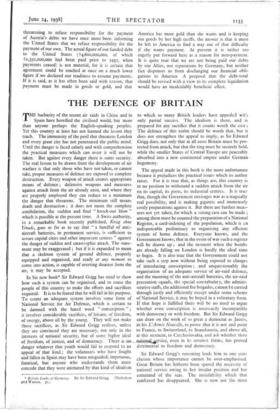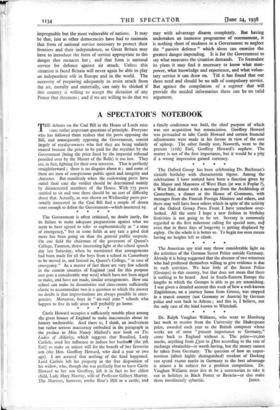THE DEFENCE OF BRITAIN T HE barbarity of the recent air
raids in China and in Spain have horrified the civilised world, but more than anyone perhaps the English-speaking peoples. Yet this country at least has not learned the lesson they teach. The immensity of the peril that threatens London and every great city has not penetrated the public mind. Until the danger is faced calmly and with comprehension the practical measures which can avert it will not be taken. But against every danger there is some security. The real lesson to be drawn from the development of air warfare is that only those who have not taken, or cannot take, proper measures of defence are exposed to complete destruction. Every weapon of attack creates appropriate means of defence ; defensive weapons and measures against attack from the air already exist, and where they are properly employed they can reduce to a minimum the danger that threatens. The minimum still means death and destruction ; it does not mean the complete annihilation, the sudden and final " knock-out blow " which is possible at the present time. A Swiss authority, in a remarkable book recently published, Krieg ohne Gnade, goes so far as to say that " a handful of anti- aircraft batteries, in permanent service, is sufficient to assure capital cities and other important centres " against the danger of sudden and catastrophic attack. The state- ment may be exaggerated ; but if it is expanded to mean that a skeleton system of ground defence, properly equipped and organised, and ready at any moment to come into action, is capable of averting disaster from the air, it may be accepted.
In his new book* Sir Edward Grigg has tried to show how such a system can be organised, and to rouse the people of this country to make the efforts and sacrifices required. It is to be feared that he will fail in his purpose. To create an adequate system involves some form of National Service for Air Defence, which is certain to be damned with the hated word " conscription " ; it involves considerable sacrifices, of leisure, of freedom, of energy, above all by the young. They will not make those sacrifices, as Sir Edward Grigg realises, unless they are convinced they are necessary, not only in the interests of national security, but of some higher ideal of freedom, of justice, and of democracy. . There is no- danger whatever that youth would fail to respond to an appeal of that kind ; the volunteers who have fought and fallen in Spain may have been misguided, impetuous, fanatical, but anyone who understands them must concede that they were animated by that kind of idealism
• Britain Looks at Germany. By Sir Edward Grigg. (Nicholson And Watson. 5s.)
Sir Edward Grigg's reasoning leads him to one con- clusion whose importance cannot be over-emphasised. Great Britain has hitherto been spared the necessity of national service owing to her insular position and her command of the seas. The inviolability which that conferred has disappeared. She is now not the most to which so many British leaders have appealed witli only partial success. The idealism is there, and is prepared for any sacrifice that it counts worth the cost ; The defence of this realm should be worth that, but it does not strengthen the appeal to imply, as Sir Edward Grigg does, not only that at all costs Britain must be pro- tected from attack, but that the ring must be securely held, while the smaller States of Central Europe are peaceably absorbed into a new continental empire under German hegemony.
The appeal made in this book is the more unfortunate because it prejudices the practical issues which its author raises. For it is true that, as things are, this country is in no position to withstand a sudden attack from the air on its capital, its ports, its industrial centres. It is true that, though the Government envisages war as a tragically real possibility, and is making gigantic and immensely costly preparations against it. But there are further meas- ures not yet taken, for which a strong case can be made ; among them must be counted the preparation of a National Register, a card-indexing of the population, which is an indispensable preliminary to organising any efficient system of home defence. Everyone knows, and the Government knows, that in the event of war such a register will be drawn up ; and the moment when the bombs are already falling on London is hardly the ideal time to begin. It is also true that the Government could not take such a step now without being exposed to charges of introducing conscription ; and unquestionably the organisation of an adequate service of air-raid defence, and the manning of the anti-aircraft batteries, the air-raid precaution squads, the special constabulary, the admini- strative staffs, the additional fire brigades, cannot be carried through justly and efficiently except under some scheme of National Service, it may be hoped in a voluntary form. If that hope is fulfilled there will be no need to argue whether even conscription is necessarily incompatible with democracy or with freedom. But Sir Edward Grigg can draw on the work of so great a democrat as Jaures, in his L'Armee Nouvelle, to prove that it is not and point to France, to Switzerland, to Scandinavia, and above all, at this moment, to Czechoslovakia, and ask whether there ,,Jagjwairiarvice, even in its severest forms, has proved detrimental to freedom and democracy. impregnable but the most vulnerable of nations. It may be that, just as other democracies have had to maintain that form of national service necessary to protect their frontiers and their independence, so Great Britain may have to introduce the form of service appropriate to the danger that menaces her ; and that form is national service for defence against air attack. Unless this situation is faced Britain will never again be able to play an independent role in Europe and in the world. The necessity of preparing adequately to resist attack from the air, morally and materially, can only be shirked if this country is willing to accept the dictation of any Power that threatens ; and if we are willing to do that we may with advantage disarm completely. But having undertaken an immense programme of rearmament, it is nothing short of madness in a Government to neglect the " passive defence " which alone can exorcize the greatest danger impending. It is for the Government to say what measures the situation demands. To formulate its plans it may find it necessary to know what man- power, what knowledge and experience, and what volun- tary service it can draw on. Till it has found that out there need and should be no talk of compulsory service. But against the compilation of a register that will provide the needed information there can be no valid argument.















































 Previous page
Previous page